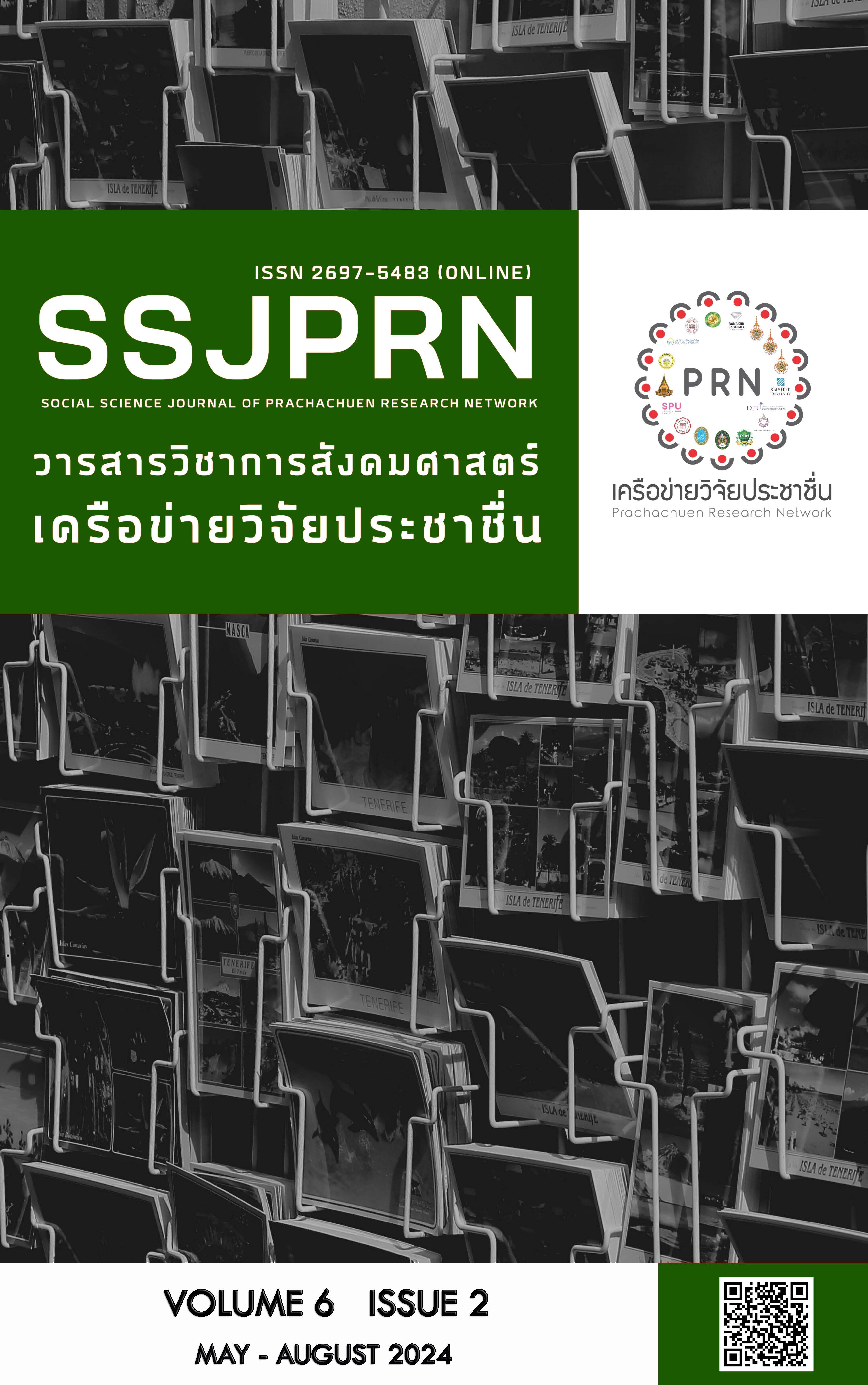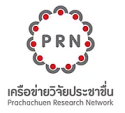ผลกระทบของความยุติธรรมในองค์การและการจัดการความหลากหลาย ที่มีต่อความไว้วางใจต่อองค์การและความผูกพันของพนักงานเจนเนอเรชันซี
คำสำคัญ:
ความยุติธรรมในองค์การ , การจัดการความหลากหลาย , ความไว้วางใจต่อองค์การ , ความผูกพันของพนักงาน, กลุ่มเจนเนอเรชันซีบทคัดย่อ
การวิจัยครั้งนี้มีวัตถุประสงค์เพื่อศึกษาผลกระทบของความยุติธรรมในองค์การและการจัดการความหลากหลายในองค์การที่มีต่อความไว้ใจต่อองค์การและความผูกพันของพนักงานกลุ่มเจนเนอเรชันซี การวิจัยเรื่องนี้เป็นการวิจัยเชิงปริมาณ ใช้วิธีการสำรวจโดยใช้แบบสอบถามเป็นเครื่องมือในการเก็บข้อมูล กลุ่มตัวอย่าง คือ พนักงานกลุ่มเจนเนอเรชันซีที่เกิดในช่วงปี ค.ศ. 1995 ถึง 2012 และทำงานภายในองค์การที่ดำเนินกิจการในพื้นที่กรุงเทพมหานครและปริมณฑล จำนวน 400 คน สถิติเชิงพรรณนาที่ใช้ในการวิเคราะห์ข้อมูลเชิงปริมาณ ได้แก่ ค่าความถี่ ค่าร้อยละ ค่าเฉลี่ยและค่าส่วนเบี่ยงเบนมาตรฐาน สถิติเขิงอนุมานที่ใช้ในการทดสอบสมมติฐาน คือ ค่าสัมประสิทธิ์สหสัมพันธ์แบบเพียร์สัน และการวิเคราะห์ในรูปแบบของโมเดลสมการโครงสร้างแบบกำลังสองน้อยที่สุดบางส่วน
ผลการวิจัยพบว่า ความยุติธรรมในองค์การ และการจัดการความหลากหลายในองค์การ มีผลเชิงบวกต่อความผูกพันของพนักงานกลุ่มเจนเนอเรชันซี อีกทั้งความยุติธรรมในองค์การและการจัดการความหลากหลายในองค์การมีผลเชิงบวกต่อความไว้วางใจต่อองค์การอย่างมีนัยสำคัญทางสถิติที่ระดับ .001 ขณะที่ความไว้วางใจต่อองค์การมีผลเชิงบวกต่อความผูกพันของพนักงานกลุ่มเจนเนอเรชันซีอย่างมีนัยสำคัญทางสถิติที่ระดับ .05 นอกจากนี้ ความไว้วางใจต่อองค์การยังทำหน้าที่เป็นตัวแปรส่งผ่านความสัมพันธ์ระหว่างความยุติธรรมในองค์การและการจัดการความหลากหลายที่มีต่อความผูกพันของพนักงานกลุ่มเจนเนอเรชันซีอย่างมีนัยสำคัญทางสถิติที่ระดับ .05
เอกสารอ้างอิง
Aggarwal, A., Jaisinghani, D., & Nobi, K. (2022). Effect of organizational justice and support on organizational commitment and employee turnover intentions: the mediating role of employee engagement. International Journal of Quality and Service Sciences, 14(4), 525-554.
Alas, R., & Mousa, M. (2016). Organizational culture and workplace spirituality. International Journal of Emerging Research in Management and Technology, 5(3), 285-314.
Albrecht, S., & Travaglione, A. (2003). Trust in public-sector senior management. International Journal of Human Resource Management, 14(1), 76-92.
Alshaabani, A., & Rudnák, I. (2020). Impact of diversity management practices on organizational climate -- an Egyptian study. Management (16487974), 36(1).
Alshaabani, A., Hamza, K. A., & Rudnák, I. (2021). Impact of diversity management on employees’ engagement: The role of organizational trust and job insecurity. Sustainability 2022, 14, 420.
Alshaabani, A., Oláh, J., Popp, J., & Zaien, S. (2020). Impact of distributive justice on the trust climate among Middle Eastern employees. Polish Journal of Management Studies, 21(1), 34-47.
Anitha, J. (2014). Determinants of employee engagement and their impact on employee performance. International Journal of Productivity and Performance Management, 63(3), 308-323.
Areheart, B. A. (2019). Organizational Justice and Antidiscrimination. Minnesota Law Review, 104, 1921-1986.
Bagozzi, R. P., & Yi, Y. (1988). On the evaluation of structural equation models. Journal of the Academy of Marketing Science, 16(1), 74-94.
Bakker, A. B., & Albrecht, S. (2018). Work engagement: Current trends. Career Development International, 23(1), 4-11.
Baran, M., & Sypniewska, B. (2020). The impact of management methods on employee engagement. Sustainability, 12(1), 426.
Baron, R. M., & Kenny, D. A. (1986). The moderator-mediator variable distinction in social psychological research: Conceptual, strategic, and statistical considerations. Journal of Personality and Social Psychology, 51(6), 1173-1182.
Batmomolin, A., Sadikin, M., Hadi, J. S., & Sadana, S. (2022). Effect of diversity management on organizational trust, employee innovative behavior, and employee engagement: Evidence from Indonesia. Scientific Papers of the University of Pardubice. Series D, Faculty of Economics & Administration, 30(2), 1-11.
Bidarian, S., & Jafari, P. (2012). The relationship between organizational justice and organizational trust. Procedia-Social and Behavioral Sciences, 47, 1622-1626.
Bilginoğlu, E., Yozgat, U., & Artan, İ. E. (2019). Respect and trust in organizations: A research about their effect on job satisfaction. OPUS International Journal of Society Researches, 12, 527-543.
Biswas, S., Varma, A., & Ramaswami, A. (2013). Linking distributive and procedural justice to employee engagement through social exchange: A field study in India. The International Journal of Human Resource Management, 24(8), 1570-1587.
Bizri, R. (2018). Diversity management and OCB: The connection evidence from the Lebanese banking sector. Equality, Diversity and Inclusion: An International Journal, 37(3), 233-253.
Bravo, R., Catalan, S., & Pina, J. M. (2020). Intergenerational differences in customer engagement behaviours: An analysis of social tourism websites. International Journal of Tourism Research, 22(2), 182-191.
Chams-Anturi, O., Moreno-Luzon, M. D., & Escorcia-Caballero, J. P. (2020). Linking organizational trust and performance through ambidexterity. Personnel Review, 49(4), 956-973.
Chillakuri, B. (2020). Understanding Generation Z expectations for effective onboarding. Journal of Organizational Change Management, 33(7), 1277-1296.
Choi, S., & Rainey, H. G. (2014). Organizational fairness and diversity management in public organizations: Does fairness matter in managing diversity?. Review of Public Personnel Administration, 34(4), 307-331.
Cochran, W. G. (1953). Sampling techniques. John Wiley & Sons. Inc.
Colquitt, J. A. (2001). On the dimensionality of organizational justice: a construct validation of a measure. Journal of Applied Psychology, 86(3), 386.
Cropanzano, R., Fortin, M., & Kirk, J. F. (2016). How do we know when we are treated fairly? Justice rules and fairness judgments. Research in Organizational Behavior, 36, 139-158.
Devendhiran, S., & Wesley, J. R. (2017). Spirituality at work: enhancing levels of employee engagement. Development and Learning in Organizations: An International Journal, 31(5), 9-13.
Downey, S. N., Van der Werff, L., Thomas, K. M., & Plaut, V. C. (2015). The role of diversity practices and inclusion in promoting trust and employee engagement. Journal of Applied Social Psychology, 45(1), 35-44.
Fornell, C., & Larcker, D. F. (1981). Structural equation models with unobservable variables and measurement error: Algebra and statistics. Journal of Marketing Research, 18(3), 382-388.
Fujishiro, K., & Heaney, C. A. (2009). Justice at work, job stress, and employee health. Health Education & Behavior, 36(3), 487-504.
Ghasempour Ganji, S. F., Rahimnia, F., Ahanchian, M.R., & Syed., J. (2021). Analyzing the impact of diversity management on innovative behaviors through employee engagement and affective commitment. Iranian Journal of Management Studies, 14(3), 649-667.
Greenberg, J. (1990). Organizational justice: Yesterday, today, and tomorrow. Journal of Management, 16(2), 399-432.
Grow, J. M., & Yang, S. (2018). Generation-Z enters the advertising workplace: Expectations through a gendered lens. Journal of Advertising Education, 22(1), 7-22.
Hajiar, S. T. (2014). A statistical study to develop a reliable scale to evaluate instructors within higher institution. WSEAS Transactions on Mathematics, 13, 885-894.
Jiang, Z., Gollan, P. J., & Brooks, G. (2017). Relationships between organizational justice, organizational trust and organizational commitment: a cross-cultural study of China, South Korea and Australia. The International Journal of Human Resource Management, 28(7), 973-1004.
Kim, W., Kolb, J. A., & Kim, T. (2013). The relationship between work engagement and performance: A review of empirical literature and a proposed research agenda. Human Resource Development Review, 12(3), 248-276.
Kozlowski, S. W. J. (2023). Informational justice and transparency: Implications for organizational behavior. Organizational Behavior and Human Decision Processes, 164, 42-55.
Loi, R., Hang‐Yue, N., & Foley, S. (2006). Linking employees' justice perceptions to organizational commitment and intention to leave: The mediating role of perceived organizational support. Journal of Occupational and Organizational Psychology, 79(1), 101-120.
Macey, W. H., Schneider, B., Barbera, K. M., & Young, S. A. (2011). Employee engagement: Tools for analysis, practice, and competitive advantage. John Wiley & Sons.
Mubashar, T., Musharraf, S., Khan, S., & Butt, T. A. (2022). Impact of organizational justice on employee engagement: The mediating role of organizational trust. Cogent Psychology, 9(1), 2080325.
Nešić, A., Veljković, S. M., Meško, M., & Bertoncel, T. (2020). Correlation of trust and work engagement: A modern organizational approach. Amfiteatru Economic, 22(14), 1283-1300.
Nunnally, J. C., & Bernstein, I. H. (1994). Psychometric Theory. McGraw-Hill.
O’Connor, E. P., & Crowley-Henry, M. (2019). Exploring the relationship between exclusive talent management, perceived organizational justice and employee engagement: Bridging the literature. Journal of Business Ethics, 156, 903-917.
Oosthuizen, A., Rabie, G. H., & De Beer, L. T. (2018). Investigating cyberloafing, organisational justice, work engagement and organisational trust of South African retail and manufacturing employees. SA Journal of Human Resource Management, 16(1), 1-11.
Peterson, R. A. (2000). A meta-analysis of variance accounted for and factor loadings in exploratory factor analysis. Marketing Letters, 11, 261-275.
Rasool, S. F., Wang, M., Tang, M., Saeed, A., & Iqbal, J. (2021). How toxic workplace environment effects the employee engagement: The mediating role of organizational support and employee wellbeing. International Journal of Environmental Research and Public Health, 18(5), 2294.
Rich, B. L., Lepine, J. A., & Crawford, E. R. (2010). Job engagement: Antecedents and effects on job performance. Academy of Management Journal, 53(3), 617-635.
Saks, A. M. (2006). Antecedents and consequences of employee engagement. Journal of Managerial Psychology, 21(7), 600-619.
Saks, A. M., & Gruman, J. A. (2014). What do we really know about employee engagement?. Human Resource Development Quarterly, 25(2), 155-182.
Samuel, A. P., & Odor, H. O. (2018). Managing diversity at work: Key to organisational survival. Culture, 10(16), 40-46.
Savalei, V., & Bentler, P. M. (2005). A statistically justified pairwise ML method for incomplete nonnormal data: A comparison with direct ML and pairwise ADF. Structural Equation Modeling, 12(2), 183-214.
Sharma, A. (2016). Managing diversity and equality in the workplace. Cogent Business & Management, 3(1), 1212682.
Singh, U., & Srivastava, K. B. (2016). Organizational trust and organizational citizenship behaviour. Global Business Review, 17(3), 594-609.
Soni, D., & Mehta, P. (2020). Manifestation of Internal CSR on Employee Engagement. Indian Journal of Industrial Relations, 55(3), 441-459.
Sousa‐Lima, M., Michel, J. W., & Caetano, A. (2013). Clarifying the importance of trust in organizations as a component of effective work relationships. Journal of Applied Social Psychology, 43(2), 418-427.
Syah, T. Y. R., Ambarini, D. A., Rojuaniah, R., Hafidz, I. L. H., & Azizah, F. N. (2023). Impact of diversity management against employee engagement in B2B companies. Riwayat: Educational Journal of History and Humanities, 6(3), 806-815.
Tan, H. H., & Lim, A. K. (2009). Trust in coworkers and trust in organizations. The Journal of Psychology, 143(1), 45-66.
Tippins, M. J., & Sohi, R. (2003). IT competency and firm performance: Is organizational learning a missing link?. Strategic Management Journal, 24(8), 745-761.
Tremblay, M., Cloutier, J., Simard, G., Chênevert, D., & Vandenberghe, C. (2010). The role of HRM practices, procedural justice, organizational support and trust in organizational commitment and in-role and extra-role performance. The International Journal of Human Resource Management, 21(3), 405-433.
Ugwu, F. O., Onyishi, I. E., & Rodríguez-Sánchez, A. M. (2014). Linking organizational trust with employee engagement: The role of psychological empowerment. Personnel Review, 43(3), 377-400.
Under, I., & Gerede, E. (2024). Relationship Between Organizational Justice and Organizational Trust Perceptions and Voluntary Non-Reporting in Aviation. The International Journal of Aerospace Psychology, 1-18.
Valentine, S., & Godkin, L. (2017). Banking employees’ perceptions of corporate social responsibility, value-fit commitment, and turnover intentions: Ethics as social glue and attachment. Employee Responsibilities and Rights Journal, 29, 51-71.
Wan, H. L. (2016). Organisational justice and citizenship behaviour in Malaysia. Springer.
Wood, J. (2018). How Can We Transform Generation Z if We Don’t Know Anything About Them?. 2018 Transformative Learning Conference Proceedings. https://jotl.uco.edu/index.php/jotl/article/view/332
Yuan, K. H., & Bentler, P. M. (2000). Three likelihood-based methods for mean and covariance structure analysis with nonnormal missing data. Sociological Methodology, 30(1), 165-200.
Zanabazar, A., Jigjiddor, S., & Jambal, T. (2022). The impact of work-related stress on job satisfaction and organizational trust during COVID-19 pandemic. SHS Web of Conferences, 135, 01019.
ดาวน์โหลด
เผยแพร่แล้ว
รูปแบบการอ้างอิง
ฉบับ
ประเภทบทความ
สัญญาอนุญาต
ลิขสิทธิ์ (c) 2024 วารสารวิชาการสังคมศาสตร์เครือข่ายวิจัยประชาชื่น

อนุญาตภายใต้เงื่อนไข Creative Commons Attribution-NonCommercial-NoDerivatives 4.0 International License.
บทความที่ได้รับการตีพิมพ์เป็นลิขสิทธิ์ของวารสารวิชาการสังคมศาสตร์เครือข่ายวิจัยประชาชื่น







